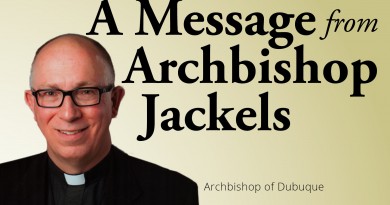Summary reflection 4: Sharing in the poverty of Jesus
By Archbishop Michael Jackels
Witness Publisher
The following is a summary reflection of the fourth talk given by Father Raniero Cantalamessa to the US bishops during their 2019 retreat:
We begin by being with Jesus, and being taught by him, and imitating him, say, by sharing his poverty.
We shouldn’t romanticize poverty; the poor can be greedy. And while being rich isn’t a sin, love of money can lead to sins, like pride, injustice, and even idolatry.
Jesus’ poverty is unique. He didn’t lack what’s needed to live in dignity; for example, he had a house (Mark 2:1), as well as food and drink aplenty (Matthew 11:19).
Also, he doesn’t teach that his followers have to renounce the acquisition, possession, or use of material goods; instead, they are to be poor in spirit (Matthew 5:3).
Jesus wasn’t poor, and he doesn’t require his followers to be poor. Rather, he modeled (Luke 8:1-3) and taught his followers to live a shared life (Acts 2), which is essentially the biblical teaching stewardship:
We learn from the Bible that we don’t own anything. All is on loan from God, entrusted to us by God to manage (stewards) according to the good pleasure of God, the owner.
And God’s good pleasure is that we use what is entrusted to us to take care of our own needs, as well as the needs of those who are dependent on us.
After taking care of our needs, God would have us also share our time, talent, and treasure with the poor, as well as in support of the Church’s mission and ministry.
In sum, gospel poverty is firstly an assessment of time, talent, and treasure: they are innocent in themselves; good if they serve our needs; evil if we end up serving them.
Secondly, it involves a true estimation of what our needs really are, careful not to stretch the definition of need to include want.
Thirdly, the shared life Jesus taught and lived includes sacrifice, giving not just from our surplus, but also out of what we need to live, and out of our need to give.
Fourthly, there is no one-size-fits-all practice of gospel poverty; it will differ according to our state of life, who is dependent on us, and other circumstances.
Lastly, it is tension-filled, nagging us with the question: “Am I truly following the teachings and example of Christ?” And feeling haunted by the adequacy of our answer.
Do you share Jesus poverty? With whom or for what benefit do you live a shared life?


